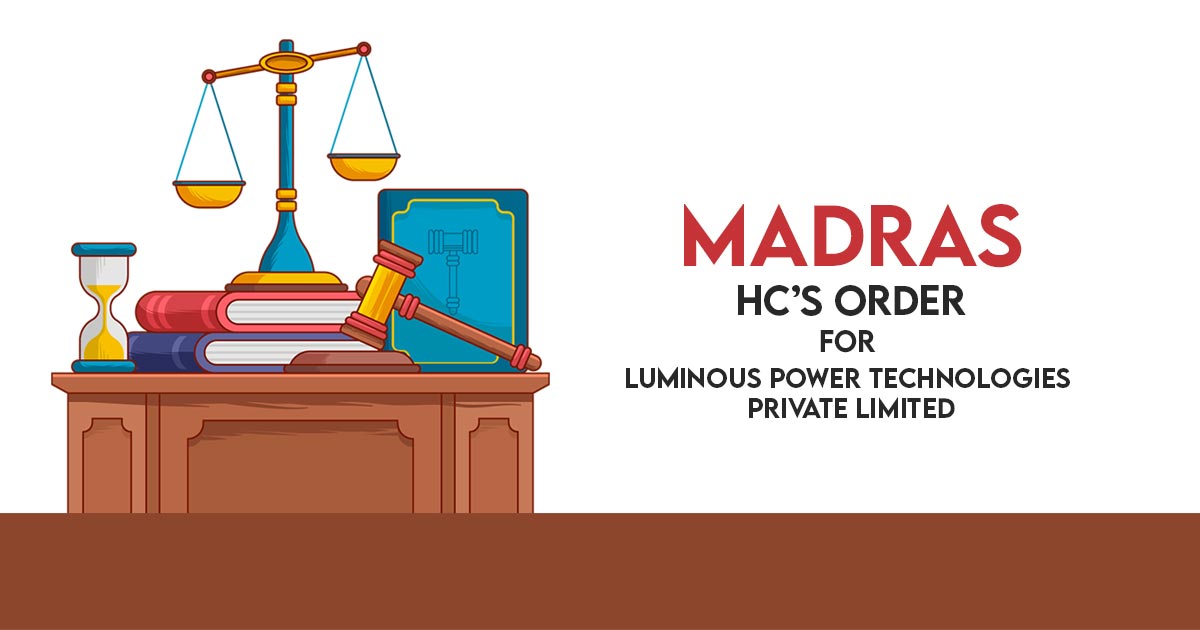
No credit notes were issued under section 34 of the Central Goods and Service Tax Act, 2017 at the time of returning the goods without obtaining them via the receiver, Madras High Court (HC) ruled. Under Section 34 of the CGST Act, 2017 Purpose of Credit Note / Debit Note is functional merely if the return of goods is due to unfructified sales/refusal of the consignee to take goods delivery. The buyer has declined to take the goods delivery and these were again transported to the applicant’s factory.
The petitioner Luminous Power Technologies Private Limited, contested the impugned notice on 30.12.2022 issued under Section 129(3) of the Central Goods and Services Tax (CGST) Act, 2017 read with the Tamil Nadu Goods and Services Tax (TNGST) Act, 2017, which aimed to levy the penalty on the applicant.
The transported goods were beneath inspection under the provisions of sub-section (3) of section 68 of the Central Goods and Services Tax Act, 2017 read with sub-section (3) of section 68 of the State/Union Territory Goods and Services Tax Act, 2017 or under section 20 of the Integrated Goods and Services Tax Act, 2017 read with sub-section (3) of section 68 of the Central Goods and Services Tax Act, 2017 on 29.12.2022 and specific differences were seen.
The products are delivered from Chennai to Tiruppur in accordance with the invoice. Goods are being transported from Tiruppur to Chennai at the time of the interception. As a result of unfructified sales, it is assumed that products are returnable. As required by Section 34 of the Act, delivery challans, credit notes, and debit notes under GST must be included with any products returned owing to unfructified sales.
The credit/debit note has not been issued by the taxable person. As a result, section 129 of the Act is needed because the commodities being moved are considered to be movements without the documents required by section 34 read with regulation 55 of the Act. As a result, a penalty under Section 129 of the Act is imposed.
The goods as well as the conveyance utilised for the goods movement were detained under sub-section (3) of section 68 of the Central Goods and Services Tax Act, 2017, and sub-section (1) of section 129 of the Central Goods and Services Tax Act, 2017 read with sub-section (3) of section 68 of the State/Union Territory Goods and Services Tax Act, 2017 or under section 20 of the Integrated Goods and Services Tax Act, 2017 read with sub-section (3) of section 68 of the Central Goods and Services Tax Act, 2017 by giving an order of detention in FORM GST MOV 06.
It was seen that the proper officer under Section 129(3) of the CGST Act, seizing the goods or conveyances will provide a notice that mentions the tax and penalty liable to get paid and hence issues the payment tax and penalty order under clause (a) or clause (b) or clause (c). Under Section 129(5) of the CGST Act, on payment of the amount directed to in subsection (1), all proceedings in regard to the notice stated in sub-section (3) shall be considered to be completed.
Justice C Saravanan ruled that “The petitioner has to merely declare the details of the Credit Note in the monthly return during which the Credit Note is issued for adjustment of tax liability. The question of issuing Credit Notes also will arise only by the supplier and not by the recipient.”
The first respondent’s contested notice was dismissed by the court after it permitted the Writ Petition.
| Case Title | Luminous Power Technologies Private Limited |
| Citation | W.P.No.17241 of 2023 |
| Date | 26.07.2023 |
| Counsel For Appellant | Mr.V.Prakash, Mr.K.Krishnamoorthy |
| Counsel For Respondent | Mr.V.Prashanth Kiran Advocate |
| Madras High Court | Read Order |









